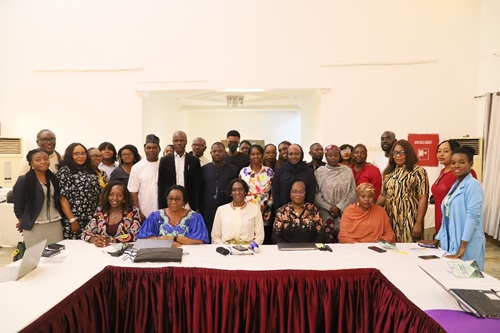
Nigeria’s biotechnology regulatory agency, the National Biosafety Management Agency (NBMA), has launched a capacity-building workshop aimed at training its staff and stakeholders on effective biosafety communication.
During the opening ceremony of the two-day Biosafety Communication Workshop held in Abuja, organised in collaboration with the Program for Biosafety Systems (PBS), NBMA’s director-general, Dr. Agnes Asagbra emphasised the workshop’s objective to enhance participants’ understanding of biosafety regulations, improve communication strategies and promote collaborative learning.
She described these objectives as timely and essential for navigating the complexities of modern biotechnology and its regulation.
“Biosafety is a cornerstone of our work at NBMA,” she stated. “Ensuring the safe use of modern biotechnology is critical to protecting our environment, health, and biodiversity. Effective communication is central to achieving this goal. Through clear, transparent and engaging communication, we can build public trust, inform stakeholders, and promote informed decision-making.”
Asagbra highlighted that the workshop was designed to provide participants with the tools and strategies required to effectively communicate biosafety regulations.
“We will explore diverse topics such as the role of misinformation, strategies to engage stakeholders, and Kenya’s experience in biosafety communications, among others. By the end of this workshop, I am confident we will all be better equipped to convey the importance of biosafety in ways that resonate with our diverse audiences,” she added.
She urged participants to actively contribute, share insights, and learn from one another while using the opportunity to strengthen networks, enhance skills and advance biosafety in Nigeria.
In his presentation titled Status of Global Biosafety Regulatory Systems, PBS Nigeria country coordinator, Dr. Matthew Dore stated that governments worldwide are committed to ensuring the safe application of modern biotechnology, which has been in use for decades.
“Governments globally strive to enact regulations that protect their citizens, society, and the environment,” he said. “These principles extend to regulations for plants and crops intended for human health, food, feed, and industry. While approaches may differ across countries, the ultimate goal remains the same.”
Dore highlighted that differences in cultural, socioeconomic, and environmental factors have shaped biosafety progress across Africa. Of the 54 African countries, only 11 currently cultivate genetically modified (GM) crops.
He elaborated that there are currently 16 countries with laws, regulations, or policies on biotechnology; 11 countries experienced in assessing applications for commercialization (including Burkina Faso, Egypt, Eswatini, Ethiopia, Ghana, Kenya, Malawi, Nigeria, South Africa, Sudan and Zambia); 7 countries with laws regulating GMOs, 49 countries that have signed and ratified the Cartagena Protocol on Biosafety (CPB) and 12 countries that have passed biosafety laws: 12
In another presentation, Mrs. Modupe Adeyemo, senior programme officer from the African Union Development Agency – New Partnership for Africa’s Development (AUDA-NEPAD), acknowledged significant progress in biosafety regulation across Africa but noted persistent challenges.
“Funding gaps, regulatory enforcement, and stakeholder coordination remain critical barriers,” she said. “To ensure the safe management of modern biotechnology, Africa must prioritise increased investment in biosafety infrastructure, enhance regulatory frameworks and foster regional and international collaboration.
“We call on stakeholders to play proactive roles in strengthening biosafety systems, fostering public awareness and ensuring sustainable support for Africa’s development agenda,” she added.
Speaking to journalists, deputy director of planning, research, and statistics at the Federal Competition and Consumer Protection Commission (FCCPC), Mercy Ogwu emphasised the need for greater public engagement on biosafety regulations.
She noted that the NBMA had taken steps to improve consumer engagement by signing a memorandum of understanding with the FCCPC to enhance awareness about biotechnology and its regulation in Nigeria.
Ogwu praised the workshop organisers, stating that such engagements and capacity-building efforts are crucial in combating misinformation about biotechnology in the country.
Participants at the workshop were drawn from the NBMA, FCCPC, National Orientation Agency (NOA), National Agency for Food and Drug Administration and Control (NAFDAC), Agricultural Research Council of Nigeria (ARCN), Nigeria Agricultural Quarantine Service (NAQS) and other relevant agencies.


